In past posts, I have talked about how mindful eating can help with weight loss, but today’s post is a little different. Today I wanted to talk about Mindful Living. Mindful living even when you are NOT currently eating, can benefit multiple areas of your life including emotional eating?
In other words, mindful living can help with weight loss even when food is not directly involved. Let me explain…
You are probably not surprised when I say weight struggles are usually more about our emotional struggles that anything else. Life is HARD. Sometimes we have more stress than we can bare. We need a way to cope, and overeating can feel like a quick fix. Bottom line, stress and other emotions are a major player in weight gain. But what does this have to do with mindful living?

Disclosure: This site may provide affiliate links (See full disclosure)
First, What is Mindfulness?
Mindfulness is about being in the present moment. The past is gone and the future has not happened, but the present is HERE and NOW. Think about it. What do we spend most of our time stressing and worrying about?…The past and the future. Think about how much less stress we would have if we learned to focus on the present moment. Mindful eating is about focusing on eating and enjoying every bite. Mindful living is about focusing and enjoying whatever you are doing in that moment. Mindfulness is also about having a grateful approach to life. When we are mindflully living, we focus on the positive and what we are thankful for in the present moment. For me, mindfulness is about focusing on God’s presence in our lives at every moment and focusing on the beauty in God’s world. Sounds simple right? Yeah, I know. It is a lot easier said than done. Sometimes we will still worry about the past and future, but fortunately mindfuless exercises can help us live in the present a little more often.
Does the Bible Have Anything to Say About Mindfulness?
The characteristics of mindfulness are making space for quiet time and rest, living in the moment, having a gratitude attitude, and (for me) pausing to focusing on God’s presence in our every day lives. Turns out the Bible has a lot to say about these characteristics. I listed a few of my favorite Bible verses about Mindfulness in the infograph below.
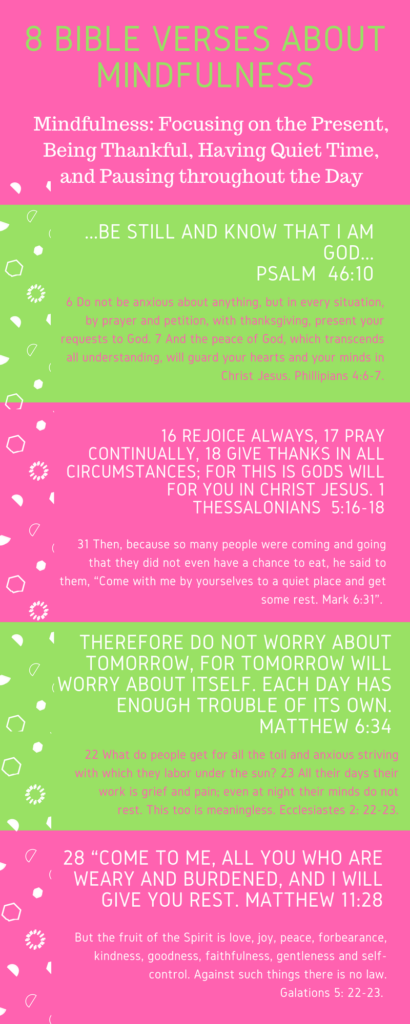
So How Does Mindful Living Help with Emotional Eating?
Our emotions usually come from either worrying about the past or future. Mindfulness helps us cope with the stresses of life. By living mindfully, we can focus on the present instead of worrying about the past and future. So if you find that you often emotionally eat ( and many of us do including me), perhaps adapting some, if not all, of these six daily mindfulness techniques will be just what your soul has been longing. Perhaps these techniques can take the place of emotional eating as a way to cope with the stresses of life.
Daily Mindfulness Exercises: What does a Mindful Day Look Like?
Hopefully we have established the characteristics of mindfulness, but how do we incorporate mindfulness into our daily lives?
For me, a mindful day would look like this:
1. Pause, Breath, and Pray Before Entering a New Place
Pause…take a moment to breath and mindfully pray before entering a new environment. When I pray, I ask God to help me remember to show love and kindness in this current environment. I then thank God for being with me, and I pray that I hear and mindfully listen for God’s guidance while I am in this place. So pausing and praying before entering a new environment means, I pray on the way to my kids school, before entering the grocery store, or my friends house. I pray before a family reunion or a meeting at work. By doing this, I remember God is with me everywhere. By pausing, breathing, and praying, I better focus on the moment and on God everywhere. This act keeps me calm and comforted and helps me react in a more loving way in different situations. I actually have a cool story about this here.
2. Use Your Senses to Focus on the People and the Place
Once you have entered each new environment, place, or building, focus on the people and the place you are in. In other words, use your senses to be present in the moment instead of thinking about all the things you have to do later. This is particularly important to me when I am with my children. Worrying about all that I have to do, doesn’t help me, and I miss out on beautiful moments with my kids when I worry about things I can’ do anything about in that moment.
You know, I recently caught myself worrying instead of being present. I was late for a meeting, and I was waiting on my daughter’s teacher to arrive so that I could leave for the meeting. While I was impatiently waiting, my 4 year old daughter was twirling and giggling. I suddenly realized that I was missing out on what was right in front of me. I couldn’t do anything about being late so why should I worry? At that moment, I stopped worrying and started twirling and giggling with my daughter. This moment of waiting ended up being a beautiful, special moment, all because I chose to live in the moment.
3. Practice Gratitude (There are Actual Exercises that Help!)
When we approach life with a grateful attitude and look for the good in life, the benefits are endless. According to “Time Special Edition Mindfulness: The New Science of Health and Happiness,” gratitude practices have been associated with improved kidney function, reduction in blood pressure, decreased stress hormones, increased energy levels, and increased reports of happiness. When we focus on the positive aspects of life, we tend to have more compassion and kindness for others; thus, the the circle of positivity continues. Now the person you showed kindness to may leave feeling more grateful and positive. Now they will be more likly to pass it on.
Gratitude Techniques:
Keep a gratitude journal is a helpful gratitude technique. Every night, write down what you were thankful for that day. If that is too much, simply writing down one thing you are grateful for every day. Again, according to “Time Special Edition Mindfulness: The New Science of Health and Happiness,” even this small exercise is also helpful.
Don’t want to even write? Try this… You remember that moment you pause and pray before entering a new place? While you are praying, remember to thank God for something as well.
4. Making Time for Quiet Time
We all need to rest. We need time to clear our thoughts and feel the weight of responsibility lifted for a little while. When I take time to just relax in God’s presence, it feels like a chance to completely be myself with the only One who loves me unconditionally. The problems of the world are gone for a moment. I am safe, free, and at peace. My favorite ways to experience quiet time with God is through prayer, reading: either the Bible or uplifting faith books, and through journaling, which brings me to mindfulness technique number five…
5. Mindful Living: Journaling
You can do three of these five techniques in one with journaling. You can practice gratitude, focus on God’s presence, and have quiet time all through mindful journaling. Keeping a journal has been a part of my life for years, but I truly saw the dfference in my outlook on life when I focused on God and gratitude as I wrote.
In my mindful journal I now include:
- All the positve things about the day (what I am grateful for)
- Written prayers or letters to God
- Any lessons I learned through either my experiences, reading, or Bible studies
- Any questions I have about life
- God moment stories: These are stories about when I notice God working in my life. One cool thing about taking the time to mindfully notice God’s presence every day is that…you notice God’s presence regularly. Since I started mindfully taking the time to notice God in the present moment, I have had so many “goose-bump” God moments. These are those moments that I think, ‘oh I will rememner this,’ but as time passes, I find I can’t remember the details. Before including these God moment stories in my journal, I would remember something pretty cool happened, but I couldn’t bring the vague memory to the surface in my mind. By including these God moment stories in my journal, I solidify these events to my memory, and if I do forget, I can look at my journal and experience the awe and wonder all over again.
6. Mindful Eating
Okay, I know I have been talking about non-eating mindfulness techniques that help with emotional eating and weight loss, but mindful eating techniques are a part of living a mindful day, and mindful eating can definitely help with emotional eating and weight loss. Mindful eating does more than help with weight loss though. Mindful eating is also a time to pause from the day and focus on God, feel grateful, and enjoy a peaceful experience. When I mindfully focus on God’s presence while eating, I do much less overeating. In fact, I like to say a little prayer before I eat. As I pray, I think about 1 Corinthians 10:31 which says, “ So whether you eat or drink or whatever you do, do it all for the glory of God.”
My prayer before I eat goes something like this, “God, thank you so much for this food. Thank you for this time that I have to sit and enjoy the food you have given me. I want to eat for the glory of You, God.” After saying this prayer, I enjoy my food, and I enjoy my time eating in God’s presence. You can find more details about how to mindfully eat in my post, “How to Lose Weight Through Mindful Eating: A Step-by-Step Guide.”
And there you have it; six mindfulness exercises you can incorporate into your day. Adding these techniques to your daily life may just be what you were needed to reduce your emotional eating.
If you Liked these Mindfulness techniques then you may also like…
18 Weeks to a Healthier, Happier, More Purposeful Life
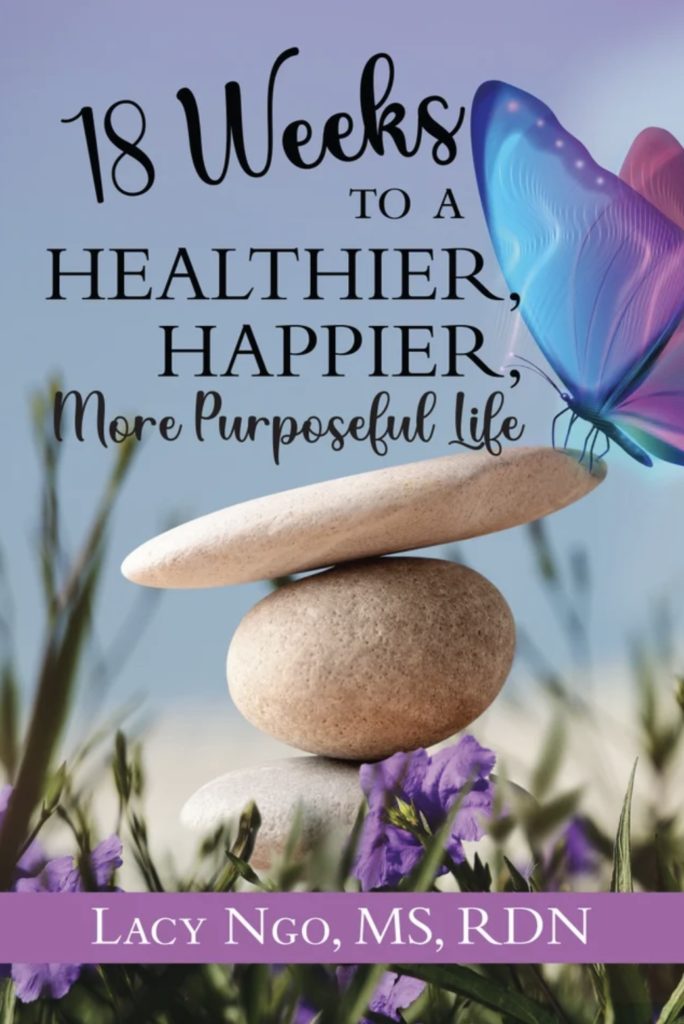
18 Weeks to a Healthier, Happier, More Purposeful Life takes you on an inspiring and uplifting journey with dietitian, Lacy Ngo. Thanks to faith-based mindfulness and nutrition, Ngo went from being weight obsessed to feeling healthy and happy in her own body. Ironically, during the process, Ngo ended up, not only losing weight but also strengthening her walk with God. Now she feels healthier than ever AND she truly enjoys eating! She is able to feed her mind, body, and soul nourishing foods and feel good in her own body without weight obsessing. Get ready to get goose-bumps as you read this amazing true story.
*A Bonus Mindful Wellness Journal is Included!!!
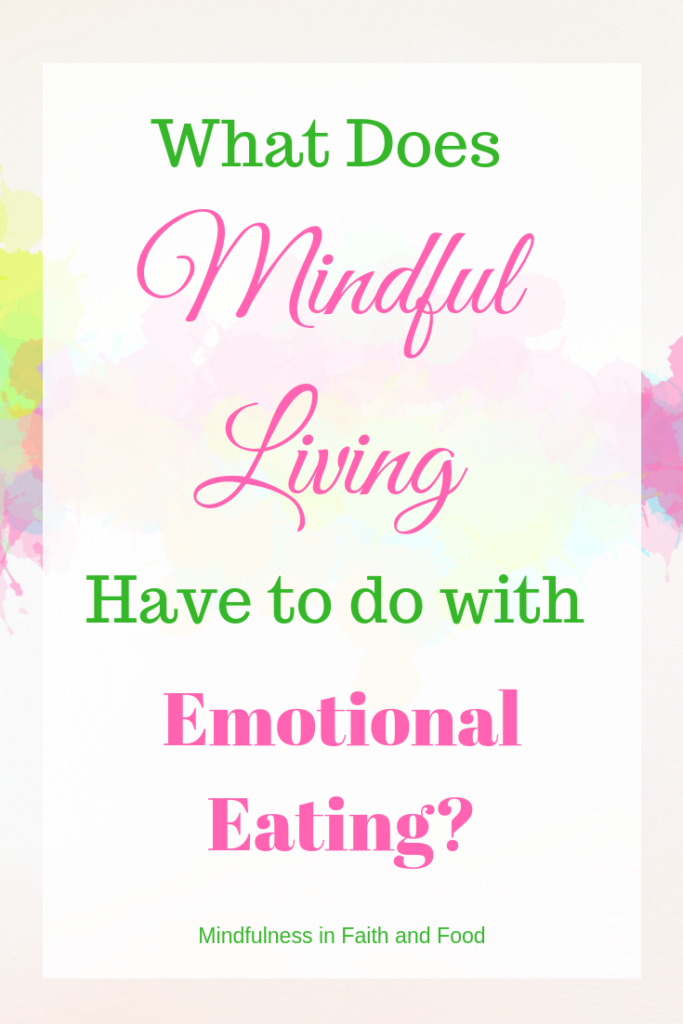
The Nourishing Meal Builder
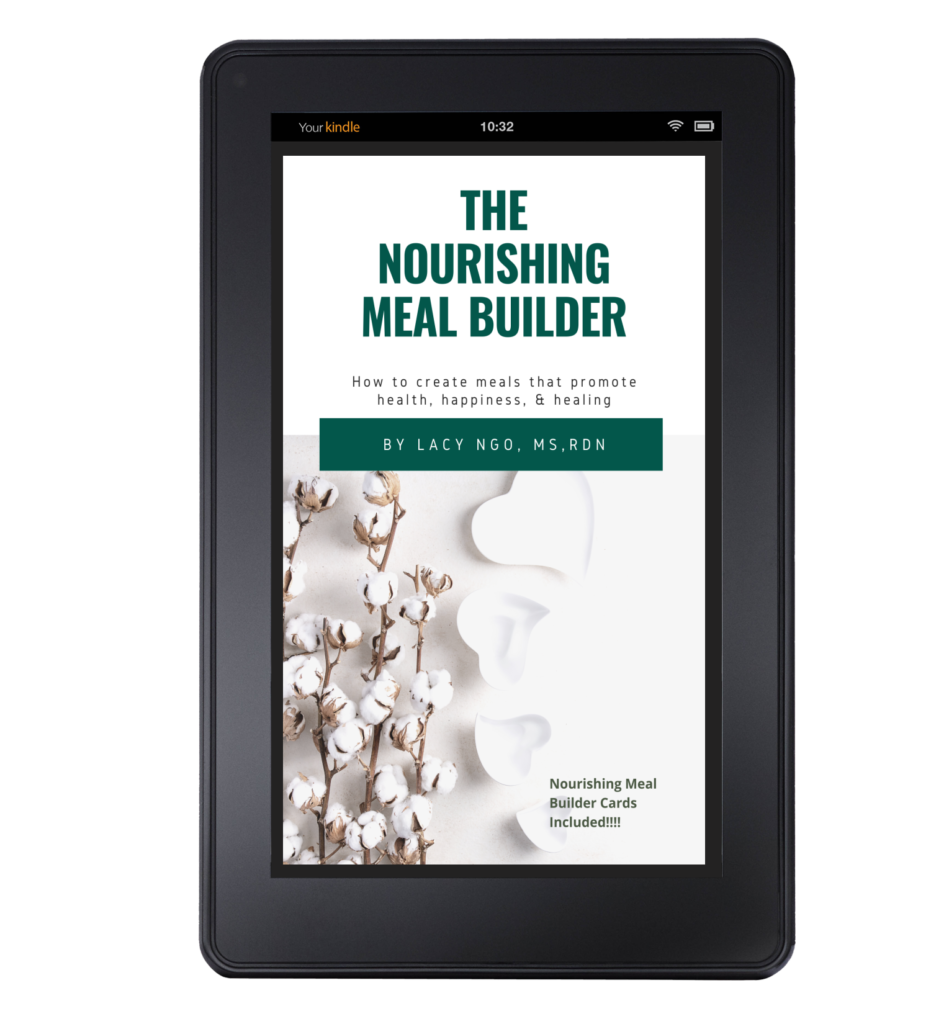
The Nourishing Meal Builder and the included Nourishing Meal Builder Cards take the stress out of cooking nourishing, healing meals! Motivated by her son’s illnesses and her own symptoms, Lacy Ngo became passionate about providing an easy strategy that busy families could use to implement research-based nutrition into their daily lives.
After incorporating these strategies into her own life, Ngo was even more convinced that nutrition can change lives:
-Her mood improved
-Her seasonal allergies stopped showing up in the fall and spring
-Her energy improved
-Her acne went away
-Her family got sick less often
-Her son’s behavior and anxiety improved
What’s included in The Nourishing Meal Builder?
-Lists of nutrients and foods that boost mood; promote cognitive function, focus, attention, alertness, and memory; support the immune system; aid in weight loss; and reduce the risk of chronic diseases, autoimmune diseases, Alzheimer’s disease, joint pain, and even seasonal allergy symptoms
-A simple Meal Plan Checklist
-A faith-based mindfulness and mindful eating guide
-Printable Meal Builder cards
Mindfulness in Faith and Freezer Meals” ebook
The “Mindfulness in Faith and Freezer Meals” ebook not only includes more mindful eating strategies and techniques, but this ebook also includes a detailed freezer meal plan and weight loss guide!
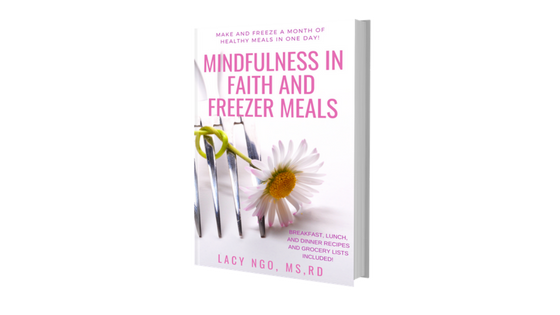
The “Mindfulness in Faith and Freezer Meals” eBook has 22 Chapters full of helpful information and tips including:
- The “What is Preventing You From Living a Healthier Life?” interactive quiz
- Mindful Eating Guide
- The Importance of Faith
- A Complete Healthy Freezer Meal Plan: You will learn how to cook all of your breakfasts, lunches, and dinners for a whole month in ONE day. Don’t worry, I don’t just give you a bunch of recipes and tell you to cook them in one day. The ebook includes strategies and “Pro Tips” on HOW to efficiently cook your meals in one day.
The goals of cooking all of your meals in ONE Day are:
- More daily free time,
- A decreased grocery bill,
- Healthier meals for the whole family,
- Less daily stress, and
- Weight Loss/Weight Maintenance
Learn more about the “Mindfulness in Faith and Freezer Meals” eBook here.
Related Posts
How I Lost 55 Pounds Through Mindful Eating
Mindful Eating For Weight Loss: A Step-by-Step Guide
*If you would like to evaluate your own diet and determine which tips work best for you, please take the free DIY Diet self assessment and evaluation developed by a registered dieititian.
You May Also Like
You are free to retain any and all content here for personal use, but need permission to use it anywhere else on the internet.
Photo by hang_in_there 

What tremendous thought provoking information! I love your mealtime prayer. It is easy to do things mindlessly, including eating! Pinned #pinterestninjas
Thank you so much Kristen! You are right; it is so easy to do things mindlessly!
It’s so important that we slow down, find gratitude and enjoy the moment. And that definitely applies to our meals as well! The health benefits are a total bonus too :). Thanks so much for sharing! You can never go wrong with a little more mindfulness <3
Thank your Sara!
Girl, I needed to read this today. I’m struggling to find my motivation to get back on track with my exercise/healthy eating habits since having my little one. Thanks for the great read and positive approach!
I am so so happy you found this helpful!!! I completely understand the challenges with an little one.
I’m just now starting to get really into mindfulness, so this is super helpful and healthful! I’m definitely going to focus more on pausing and appreciating.
Great post, Lacy! I can totally relate to this. I don’t know how many times a week I get distracted and just eat while I’m doing something else on my never-ending to-do list while worrying about not getting everything done. I loved the verses you quoted, very helpful to help get in the right frame of mind to be in the present and mindful.
love this! Mindful eating totally changed my relationship to food! I did a podcast episode all about it and intuitive eating! It’s such a transformative practice!
Thank you for your motivational post I am one that has definetly overheats emotionally ! It is interesting to see how use god to motivate your life and gives you something to believe in x
This is such a wonderful post that everyone needs to read! Your tips on living a mindful day are spot on. Thank you for sharing your wealth of knowledge 🙂
Thank you so much Whitney!
Thanks for sharing this motivational post. Much needed for me near the end of a busy week.
This is a great post on mindful living. I couldn’t agree more!
Such an amazing post! Love this topic and the way you wrote on it so much!
Thanks so much for sharing this post. What a delightful read!
It’s a lovely post that I ever read about a weight loss. Actually now I can determine that whenever I am in stress or in any problems I love to eat a lot of ice-cream. So, I think the way you described mind-living or mind-eating is the most important for all the people.
Thank you Josh! I am so so glad you found this helpful!